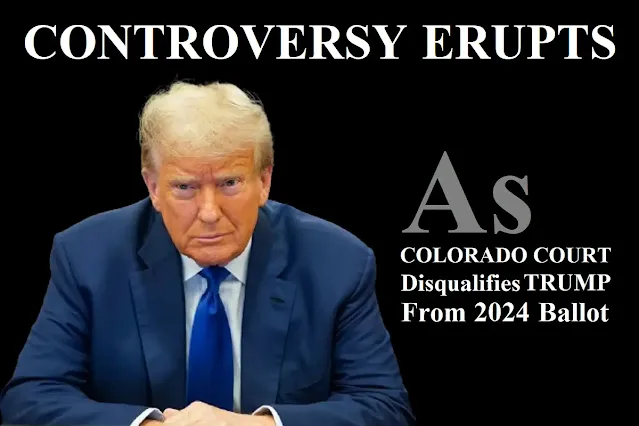In the Rocky Mountain State, a legal storm has erupted as the Colorado Supreme Court plays referee in the political showdown of the century. With Trump's 2024 aspirations hanging in the balance, the 14th Amendment takes center stage, transforming courtrooms into political arenas. Buckle up, America, as the echoes of January 6th reverberate, and the ballot battle reaches heights as lofty as the Rockies themselves.
Explore the intense fallout as the Colorado Supreme Court disqualifies former President Trump from the state's 2024 ballot, triggering passionate reactions from politicians on both sides. Delve into the legal intricacies of the 14th Amendment invoked in the ruling, the potential national implications, and the brewing legislative response. As the controversy unfolds, this article offers a comprehensive analysis of the political landscape and the impending U.S. Supreme Court decision.
Introduction:
The recent decision by the Colorado Supreme Court to disqualify former President Trump from the state's 2024 ballot has ignited a heated response from members of Congress, sparking a potential revival of the national debate surrounding the events of the Jan. 6 riot and the accountability of the former president.
The Court's Ruling
Four out of seven judges on the Colorado Supreme Court invoked the 14th Amendment's prohibition on individuals involved in "insurrection or rebellion" to bar Trump from running for office. This marks the first state to take such a stance, with the case likely headed to the U.S. Supreme Court. The Colorado judges have issued a stay until Jan. 4, allowing federal judiciary review.
Political Reactions
Members of Congress from both parties expressed strong opinions on the ruling. A House Republican questioned the intended application of the 14th Amendment in this context, while House Speaker Mike Johnson (R-La.) labeled the decision a "thinly veiled partisan attack." House Republican Conference Chair Elise Stefanik (R-N.Y.) dismissed the majority as "four partisan Democrat operatives," predicting the ruling would backfire and strengthen Trump's campaign.
Legislative Response
Senator Thom Tillis (R-N.C.) introduced a bill aimed at penalizing states making similar rulings. The proposed legislation seeks to withhold federal election administration funds from states "misusing the Fourteenth Amendment for political purposes" and clarifies the Supreme Court's "sole jurisdiction" over such cases.
Democratic Support
On the other side, Democrats supporting the case applauded the ruling. House Oversight Committee ranking member Jamie Raskin (D-Md.) asserted that the decision is firmly grounded in law and fact, emphasizing the original intent of the 14th Amendment to prevent individuals who betrayed their oath from holding office. Rep. Ted Lieu (D-Calif.) highlighted the evidence showing Trump's alleged role in inciting the January 6 mob.
Potential Ramifications
While acknowledging the ruling's merits, Raskin raised concerns about potential political violence in response to it. He stressed the importance of preparing to address any such escalation and emphasized the need for a thoughtful approach to enforcing the law.
Conclusion:
As the controversy unfolds, the nation awaits the U.S. Supreme Court's decision on this pivotal case, which has the potential to shape the political landscape leading up to the 2024 election. The fallout from this ruling underscores the deep divisions and high stakes involved in revisiting the events of January 6th.


